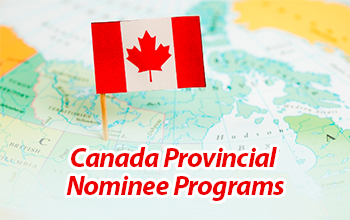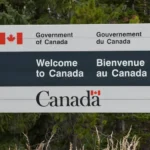
Are you interested in becoming a permanent resident in Canada through the Provincial Nominee Program (PNP) route? If yes, then this post is for you.
Provincial Nominee Programs (PNP) are very useful for applicants with a low CRS score in the Express Entry System pool, or applicants who are not eligible for Express Entry due to age, low language test scores, low years of work experience, low level of education, among other factors.
The information here covers:
- ✅Available Provincial Nominee Programs (PNPs)
- ✅How PNPs can give you 600 extra CRS score in Express Entry
- ✅Sub-categories of PNPs
- ✅PNP requirements and application fees
Provincial Nominee Programs are largely in two broad categories:
- ✅A nomination that is aligned with Express Entry (and will add 600 points to your Express Entry points).
- ✅A nomination that is NOT aligned with Express Entry (you do not need an Express Entry profile for this, and can submit your application directly for permanent residence after you are nominated). This is beneficial for those who are not eligible to create an Express Entry profile. The major difference is the processing time, which is longer than the Express Entry average processing time.
If you are new here and need more information on the Express Entry program, you will see the step-by-step guide on how to become a permanent resident in Canada using the Express Entry system here
With the increasing popularity of the Express Entry program among skilled immigrants who want to move permanently to Canada, there is also a possibility that the general Express Entry cut-off will be on the high side for some time.
The Provincial Nominee Programs (PNPs) could, therefore, be of help to applicants looking for ways to improve their scores.
Provincial Nominee Programs (PNPs) present good opportunities for candidates to earn 600 extra points if they are already in the Express Entry pool, or to immigrate through a provincial skilled immigrant program (that is not aligned to Express Entry) if they are even not eligible to set up an Express Entry profile.
There are 10 Provinces in Canada
- ✅Alberta
- ✅British Columbia
- ✅Manitoba
- ✅New Brunswick
- ✅Newfoundland
- ✅Nova Scotia
- ✅Ontario
- ✅Prince Edward Island
- ✅Quebec, and
- ✅Saskatchewan.
All these provinces have their own provincial nominee programs (except Quebec, with a separate selection system).
In addition to the 10 provinces, there are 3 Territories in Canada
- ✅North West Territories
- ✅Nunavut, and
- ✅Yukon
The Northwest Territories and Yukon have PNPs for skilled immigrants, while Nunavut does not.
In total, there are 11 Canadian provinces/territories with Provincial Nominee Programs for skilled immigrants.
Canada is a distinct country with many provinces doing things differently. So, the requirements for nominations are also different in each province.
Beyond interest, there are other boxes of eligibility and financial capability, as I always say. I will highlight the programs below with links to the program pages for you to read more details.
1) Alberta Advantage Immigration Program (AAIP)
The Alberta Advantage Immigration Program (AAIP) is an economic immigration program that nominates people for permanent residence in Alberta. Nominees must have skills to fill job shortages or be planning to buy or start a business in Alberta. They must also be able to provide for their families. The program is run by the governments of Alberta and Canada.
AAIP has 4 streams for foreign workers who are living and working in Alberta, or plan to live and work here:
- ✅ Tourism and Hospitality Stream – Qualified candidates who live and work in Alberta and have a full-time job offer to continue working with an Alberta tourism and hospitality sector employer can apply for an AAIP nomination.
- ✅ Alberta Opportunity Stream – Qualified candidates who live and work in Alberta and have a job offer from an Alberta employer can apply for an AAIP nomination.
- ✅ Alberta Express Entry Stream – Qualified candidates may be invited to apply for nomination if they have profiles in the IRCC’s Express Entry pool that are aligned with minimum requirements, and provincial economic, sector and occupational priorities. There are also dedicated pathways operated in this stream for health care professionals, technology workers and police occupations.
- ✅ Rural Renewal Stream – Temporary foreign workers who have a job offer from an Alberta employer in a designated community, and an endorsement letter from a designated community, can apply for an AAIP nomination with this.
For the Express Entry-aligned AAIP, the eligible candidates must have a minimum CRS score of 300. More information about the AAIPP and how to apply is available here
2) British Columbia PNP
The Express Entry BC (EEBC) stream of the BC Provincial Nominee Program (BC PNP) helps eligible skilled workers to gain permanent residence in B.C.
The EEBC has the following streams:
Skilled Worker, Entry Level and Semi-Skilled, and Health Authority.
- ✅ Skilled Workers
- ✅ Entry Level and Semi Skilled
- ✅ Health Authority
To help address specific labour shortages in high-demand sectors, the BC PNP prioritizes its selection of workers based on the province’s industry sector needs. These sectors are currently:
- ✅ Childcare
- ✅ Construction
- ✅ Healthcare
- ✅ Technology
- ✅ Veterinary care
Generally, if you are applying from outside Canada, you will need a job offer from an employer in British Columbia to be eligible. More information on each of the streams is available here
There are also other pathways in the BC PNP (that are not aligned to the Express Entry system) for candidates who want to become permanent residents in British Columbia, Canada.
Each pathway has specific program requirements, and you can find out more about this here
3) Manitoba Provincial Nominee Program (MPNP)
This was the first PNP to be implemented in Canada. The MPNP started in 1998, and the skilled immigrant category seeks recent graduates or skilled workers interested in living permanently in Manitoba.
According to the program website, “The MPNP for Skilled Workers is locally driven and based on the needs of Manitoba employers. The program selects internationally trained and experienced workers who have the skills needed in the local labour market, and nominates them to receive Canadian permanent resident visas to settle and work in Manitoba.”
The MPNP skilled immigrant program is in 3 sub-categories:
- ✅ Skilled Worker
- ✅ International Education
- ✅ Business Investor
You will submit an Expression of Interest to the province by yourself and be assigned points. The highest-scoring candidates are then invited to submit an MPNP application.
Manitoba Provincial Nominee Program (MPNP) prioritizes candidates with:
- Manitoba support (a friend or relative)
- Manitoba Experience (previous or ongoing education or work in the province)
- Manitoba Invitation (scouted through a recruitment mission or exploratory visit)
More information on the MPNP is available here
4) New Brunswick Provincial Nominee Program (NBPNP)
The NBPNP skilled immigrant category is for those with the skills, education, and work experience needed to contribute to New Brunswick’s economy, and who are ready to live and work in the province.
New Brunswick Provincial Nominee Program (NBPNP) prioritizes candidates with either or a combination of:
- Express Entry Profile
- Living or working currently in New Brunswick
- A letter of employment from an employer in the province (through the international recruitment sessions)
- Direct selection from the Express Entry pool
More information about the NBPNP is available here
The province also regularly conducts international recruitment exercises to attract new immigrants to the province through employment recruitment or job offers.
Information about the global recruitment exercise can be found here
5) Newfoundland and Labrador Provincial Nominee Program (NLPNP)
The NLPNP accepts skilled immigrant applications in 3 sub-categories:
- Skilled Worker
- Express Entry Skilled Worker
- International Graduate
The Newfoundland and Labrador Provincial Nominee Program is an economic immigration program designed to assist skilled immigrants and their families to live and work in Newfoundland and Labrador.
Applicants must meet certain criteria, such as having a job or job offer, the ability to economically establish themselves, and the intent to reside in the province, to be nominated for permanent residency.
This program provides applicants with a dedicated immigration officer who will remain available to explain the program requirements and processes until nominees receive their permanent residence status.
More information on the Newfoundland and Labrador Provincial Nominee Program is available here
6) Nova Scotia Nominee Program (NSNP)
Through the NSNP, prospective immigrants who have the skills and experience targeted by Nova Scotia may be nominated to immigrate. There are different streams in the NSNP.
In particular, the Nova Scotia Experience: Express Entry stream selects highly skilled individuals who wish to live in Nova Scotia permanently. Applicants must have at least one year of experience working in Nova Scotia in a high-skilled occupation.
To apply, you must:
- have at least 1 year of work experience in Nova Scotia;
- be 21 to 55 years old;
- have a Canadian high school credential or equivalent;
- prove language ability equal to Canadian Language Benchmark (CLB) Level 5 if you are in a NOC TEER category 0, 1, 2, or 3 occupation. If your first language is English or French, that is enough proof. Workers in a NOC TEER 4 or 5 occupation must have test results to prove they meet CLB 4 even if their first language is English or French;
- show enough financial resources to successfully settle in Nova Scotia.
More information on the Nova Scotia Nominee Program is available here
7) Ontario Immigrant Nominee Program (OINP)
OINP helps Ontario to meet its labour market and economic development priorities.
The Ontario Immigrant Nominee Program (OINP) is the province’s economic immigration program. It works in partnership with the Government of Canada through Immigration, Refugees, and Citizenship Canada (IRCC).
Foreign workers, international students, and others with the right skills, experience, and education apply to the OINP for a nomination.
There are three ways you may qualify for a nomination:
- Employer job offer category: for workers who already have a permanent job offer from an Ontario employer
- Human capital category: for workers who have valuable work experience, education, language skills, and a profile in Canada’s Express Entry system; or for graduate students
- Business category: for entrepreneurs looking to start a new or buy an existing business in Ontario
The skilled immigrant stream has multiple subcategories. And there are different requirements for each.
The subcategories are:
- Employer Job Offer: In-Demand Skills Stream
- Employer Job Offer: Foreign Worker Stream
- Employer Job Offer: International Student Stream
- PhD Graduate Stream
- Masters Graduate Stream
- French-Speaking Skilled Worker Stream
- Human Capital Priorities Stream
- Skilled Trades Stream
The OINP recognizes and nominates people for permanent residence who have the skills and experience the Ontario economy needs, and the Government of Canada makes the final decision to approve applications for permanent residence.
More information on the OINP is available here
8) Prince Edward Island Provincial Nominee Program (PEI PNP)
PEI, Canada’s smallest province, accepts applications from skilled immigrants through its provincial Expression of Interest portal. Candidates are invited in the Labour and Express Entry subcategories.
To be eligible for nomination through PEI Express Entry, you must:
- meet the requirements of at least one of the Federal Economic Immigration programs:
- Federal Skilled Worker Program;
- Federal Skilled Trades Program; or
- Canadian Experience Class
- create a Federal Express Entry Profile and be placed in the pool of candidates.
There are two pathways to permanent residency through the PEI Express Entry Category, depending on if you have a job offer in PEI or not. Priority will be given to applicants who are already living and working in PEI.
More information on the PEI PNP is available here
9) Saskatchewan Immigrant Nominee Program (SINP)
SINP has a list of occupations that are eligible for the program. More information on the occupations that are NOT eligible for the SINP can be found here
SINP is popular among candidates with a Saskatchewan connection. However, unlike Manitoba, SINP does not accept ‘friends’ as the provincial connection.
Your Saskatchewan connection could, however, be a parent, sibling, grandparent, aunt, uncle, niece, nephew, cousin, or step-family member or in-laws of the same relationships.
It is also NOT compulsory to have a Saskatchewan relative before you can apply for SINP, but having one will give you up to 20 additional points.
You need at least 60 points to apply for SINP. And if you have an Express Entry profile, you will qualify to apply under the International Skilled Worker: Saskatchewan Express Entry, or if you do not have a valid Express Entry Profile, you can apply through the International Skilled Worker: Occupations In-Demand Category.
Applications for nomination in Saskatchewan are also submitted through the province’s Expression of Interest portal (OASIS).
More information on the SINP is available here
10) Northwest Territories Nominee Program (NTNP)
Northwest Territories has the highest median household income in Canada. Its capital, Yellowknife, has the highest rate of employment in the country. The winter is cold, but the people are warm!
To immigrate here through the Northwest Territories Nominee Program, you need to either:
- be ready to open, purchase or invest in a business in the NWT; or
- have a job offer from an employer in the NWT.
If you’re going to Northwest Territories to open, purchase or invest in a business in the NWT, you can apply for the Business Stream.
If you have a job offer from an NWT employer, you can apply for the Employer-Driven Stream.
More information on the Northwest Territories Nominee Program is available here
11) Yukon Nominee Program (YNP)
The Yukon Nominee Program (YNP) is run by the Yukon Government in partnership with Immigration, Refugees and Citizenship Canada (IRCC) under the “Agreement for Canada-Yukon Cooperation on Immigration.”
For the YNP, you need a job offer in the province to be eligible. The YNP streams for Skilled Immigrants and Critical Impact Workers are locally driven and based on the needs of Yukon employers.
More details on the step-by-step process for this are available here
As earlier stated, Nunavut does not have a PNP for skilled immigrants, and Quebec has a separate immigration program.
You cannot immigrate to Quebec using the Express Entry program. If Quebec is your province of destination in Canada, you must apply through the Quebec-selected program.
More information on the Quebec-selected program is available here
The Final PNP Application Process
It is worth noting that being directly invited to apply for a nomination from the Express Entry pool, or submitting an Expression of Interest to a province, DOES NOT mean you have been nominated.
You will provide the required documents to the province for assessment, and then be informed if you are successfully nominated.
In addition, some provinces also charge an application fee for the nomination process. For instance, the provincial nominee program application fee in Ontario is $1,500 CAD and $350 CAD in Saskatchewan.
A successful (Express-Entry aligned) nomination will, however, add 600 points to your CRS Score. And that would increase your chances of becoming a permanent resident in Canada.
And if you are also not eligible to set up an Express Entry profile, the provincial nominee programs that are not aligned with Express Entry are options for you to immigrate to Canada.
Additional Information on Provincial Nominee Programs for students
In some provinces, like the ones listed below, there are also student categories of provincial nominee programs for students who have completed their studies at a Designated Learning Institution in these provinces.
Click on the link in each province above to learn more about this, and position yourself accordingly.
If you anticipate that you may not be eligible for a federal permanent residence program and that you may need a provincial nomination to become a permanent resident, part of your study in Canada plan as an international student should be to prioritize studying in a province that will further increase your chances of being nominated for permanent residence after your study.
Familiarize yourself with the requirements of the provincial nominee programs and check if you can use any of the provinces to increase your chances of immigrating to Canada as a permanent resident.
I hope someone finds this useful!
If you have questions on Career & Personal Development, Personal Finance, or Building a Personal Brand and want to reach out to us, check what we have here.
DISCLAIMER: The posts and information on this website are not legal advice. We are not Canadian Immigration Consultants and do NOT provide Canadian Immigration Services. For any authorized Canadian Immigration information, services, or support, please check the Government of Canada website at www.canada.ca/immigration
© Olu of Canada






Students
Hi
Thank you so much
This is well detailed